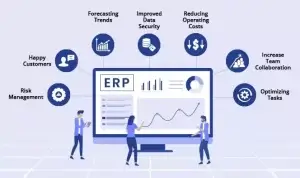In the dynamic UAE business landscape, efficient supply chain management has become a key driver of growth and competitive advantage. With growing global trade, demand for faster delivery, and rising customer expectations, traditional supply chain methods are no longer sustainable. Enterprise Resource Planning (ERP) systems have emerged as powerful tools to streamline, automate, and optimize every stage of the supply chain.
Whether you’re a logistics provider in Dubai, a manufacturer in Sharjah, or a retail supplier in Abu Dhabi, integrating ERP into your operations ensures agility, scalability, and improved decision-making.
The Growing Need for ERP in the UAE’s Supply Chain Ecosystem
Rising demand for smart logistics in the UAE
To compete in a globalized market, UAE businesses must adopt digital tools that support smart logistics:
- Jebel Ali Port – One of the world’s largest container ports, essential for imports/exports.
- Khalifa Industrial Zone (KIZAD) – A major industrial hub driving manufacturing and distribution.
Government initiatives driving automation include:
- “Operation 300bn” – Boosts industrial growth with innovation-led production.
- Dubai Silk Road Strategy – Enhances the UAE’s global trade connectivity.
These developments signal a need for ERP systems that offer speed, accuracy, and real-time coordination.
Challenges of traditional supply chain management
Manual supply chain practices lead to bottlenecks, particularly in the UAE’s fast-paced markets:
- Shipment delays – Due to poor coordination between departments.
- Miscommunication – Between suppliers, vendors, and logistics teams.
- Excessive paperwork – Slows down customs and delivery processes.
ERP minimizes these risks with automation and centralized data management.
Why UAE businesses are shifting to automation
From SMEs to large enterprises, digital transformation is happening at every scale:
- Compliance-friendly systems – ERP ensures businesses meet the UAE’s legal standards.
- Multi-department visibility – Helps teams across finance, sales, and logistics stay aligned.
- Faster response time – Enhances customer satisfaction and vendor collaboration.
Key Roles ERP Plays in UAE-Based Supply Chain Operations
Demand planning and inventory control
Accurate demand forecasting and inventory management are crucial in minimizing costs and meeting delivery goals:
- Sales forecasts – Integrated data helps predict demand more accurately.
- Inventory status – Real-time tracking ensures product availability and avoids overstocking.
- Balanced stock levels – ERP aligns production with customer demand, minimizing waste.
ERP provides full visibility into stock movements, enabling smarter planning.
Automated procurement and vendor coordination
Procurement becomes easier to manage with ERP, especially when dealing with multiple suppliers:
- Purchase request automation – Reduces approval delays and human error.
- Quote comparisons – Ensures cost-effective buying decisions.
- Vendor performance tracking – Helps build strong, long-term supplier relationships.
For UAE firms, this is particularly helpful in navigating global sourcing and fluctuating delivery timelines.
Real-time tracking of production and shipments
ERP systems bridge gaps between planning and execution:
- Production workflows – Automated task scheduling keeps processes on time.
- Shipping documentation – Digital records ensure accuracy and compliance.
- Live status updates – Managers can monitor and adjust operations as needed.
Such features make ERP a key asset for managing regional and international shipments.
Benefits of ERP for UAE Businesses in Logistics and Manufacturing
Improved communication with suppliers and customers
Centralized systems remove the need for back-and-forth emails and manual coordination:
- Transaction histories – Easily accessible for dispute resolution.
- Auto-notifications – Keep vendors and customers in the loop at each stage.
- Multi-language support – Useful for global business conducted from the UAE.
This leads to better transparency, fewer delays, and a smoother overall supply chain experience.
Cost savings through efficient workflows
Cutting down on redundant tasks frees up time and budget:
- Order processing automation – Reduces processing time and manual errors.
- Real-time budget tracking – Flags overspending before it becomes a problem.
- Reduced administrative effort – Frees up employees to focus on value-adding tasks.
In a high-cost region like the UAE, these efficiencies have a significant financial impact.
Regulatory compliance and data accuracy in UAE markets
ERP helps businesses stay ahead of strict regulations and financial standards:
- VAT compliance – Ensures accurate tax filing and invoicing.
- WPS integration – Simplifies employee payment tracking and reporting.
- Audit-ready data – Reduces the stress of regulatory inspections.
ERP not only reduces legal risks but also improves credibility with customers and partners.
Choosing the Right ERP Solution for UAE Supply Chains
Factors to consider for local businesses
Selecting the right ERP depends on your business type and operational goals:
- Arabic interface support – Enhances usability for local teams.
- Local compliance tools – Built-in VAT, WPS, and customs modules.
- Multi-currency features – Ideal for businesses with cross-border operations.
Scalability and localized support should be high-priority in the selection process.
Industry-specific ERP solutions in the UAE
Tailored ERP solutions bring higher value and lower customization costs:
- Construction ERP – Includes project timelines and procurement tracking.
- Healthcare ERP – Focuses on regulatory compliance and patient data management.
- Retail ERP – Offers POS integration and demand forecasting tools.
These industry-fit modules support fast implementation and better ROI.
Integration with existing infrastructure
The best ERP is one that fits into your current ecosystem seamlessly:
- CRM platforms – Ensures continuity across customer relationships.
- POS systems – Syncs front-end sales with back-end inventory.
- eCommerce platforms – Keeps stock, order, and delivery data aligned.
ERP integration boosts productivity without disrupting current operations.
Final Thoughts: Future of ERP in UAE’s Supply Chain Landscape
Cloud ERP adoption across the region
Cloud systems are ideal for UAE-based businesses aiming for flexibility and lower costs:
- No physical servers required – Lower setup and maintenance costs.
- Remote access – Teams can collaborate from anywhere.
- Scalability – Easily add users or features as your business grows.
Cloud ERP supports business continuity and disaster recovery—a major concern in today’s world.
Role of AI and analytics in future SCM systems
AI-enhanced ERP platforms deliver deeper insights and predictive capabilities:
- Forecasting trends – Based on historical and real-time data.
- Smart alerts – Warn users about delays, stockouts, or price shifts.
- Route optimization – Improves delivery speed and reduces fuel costs.
Such intelligence allows UAE companies to remain competitive in global markets.
Preparing for scalable supply chain operations
As businesses expand within and beyond the UAE, ERP ensures operations can grow without added complexity:
- Multi-location tracking – Manages warehouses and shipments across emirates or borders.
- Custom workflows – Adaptable to new product lines or regions.
- Performance dashboards – Help leadership track KPIs with ease.
Scalable ERP is a long-term strategic investment, not just a software upgrade.



